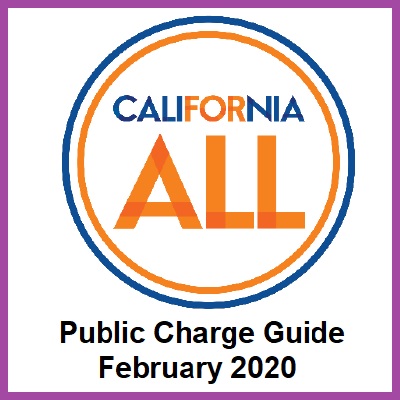
New federal policy regarding changes to what is considered a public charge, and thereby restrict who may be considered for green card or citizenship, go into effect February 24, 2020. California Health and Human Services Agency has released a Public Charge Guide. The issue for many immigrants is the use of benefits such as Medi-Cal and how that might derail their attempts to extend green cards or apply for citizenship.
One very important aspect for families with mixed residency situations (i.e. parents with green cards with children who are U.S. citizens) is that family members accessing public programs such as Medi-Cal will not be considered as part of the public charge against the parents.
Below is the bulk of the text from the CHHS guidance document that can be downloaded at the end of the post.
CALIFORNIA HEALTH AND HUMAN SERVICES AGENCY PUBLIC CHARGE GUIDE
This guide provides current information regarding federal changes to “public charge” determinations and the use of public benefits. The new policy makes many changes to the way federal immigration officials make decisions about granting individuals entry into the United States, extension of stay, or adjustment to lawful permanent resident status (also known as becoming a green card holder).
EVERY FAMILY IS DIFFERENT, REACH OUT FOR QUALIFIED LEGAL ADVICE.
It is important for concerned individuals and families to know their rights and empower themselves with accurate information to understand whether the rule affects them or not. If you have questions, an immigration or public benefits attorney can give you advice based on the specific facts of your individual situation.
A list of nonprofit organizations qualified to provide assistance to individuals to determine if the new policy will negatively impact them is available on the California Department of Social Services website.
NOT all immigrants are subject to a public charge determination.
The rule only applies to a limited number of immigrants. It does NOT apply to Refugees; Asylees; Temporary Protected Status applicants; Special Immigrant Juveniles; asylum applicants; and certain victims of crime, including domestic violence and trafficking, among others. It also does not apply to most lawful permanent residents, unless they leave the United States for over 180 days and seek to reenter.
Public benefits accepted by family members are generally NOT considered.
The federal government will consider only public benefits received directly by the person who is applying for the change in status, or if they’re listed as a beneficiary of the benefit. This means that your family members accessing public programs will not be considered as part of your public charge determination.
The new policy does NOT change eligibility rules for public benefits programs.
The new policy does not change whether individuals can apply for and receive public benefits. But it does mean that applying for or receiving certain public benefits can make the federal government more likely to deny some non-US citizens entry into the United States or adjustment to lawful permanent resident status (a green card).
UNDERSTANDING THE NEW “PUBLIC CHARGE” POLICY.
Under longstanding federal policy, the federal government may deny a non-US citizen entry into the United States, or adjustment to lawful permanent resident status (a green card), if he or she is determined likely to become a public charge based on the totality of the individual’s circumstances, including various factors in addition to the receipt of public benefits, such as income, age, health, family status, education and skills, financial status, assets, and, when applicable, a sponsor’s affidavit of support.
Last year, the federal government released a new public charge policy that expands the types of public benefits considered alongside other factors. Overall, it will become harder for lower-income immigrants to obtain green cards.
Beginning February 24, 2020, the federal government will begin implementing this new policy. Individuals will be required to disclose their application for or use of certain benefits as part of their immigration application. An immigration attorney can advise what public benefits must be disclosed as part of the processing.
Only certain benefits are considered “public benefits” for purposes of public charge.
If you intend to apply for or receive benefits from the following public programs and intend to apply for a green card, visa, or admission into the United States, consulting with an immigration or public benefits attorney will help you better understand whether those benefits may impact your individual case.
• CalFresh or SNAP
• Medi-Cal or Medicaid*
• In-Home Supportive Services Program
• Federal Public Housing and Section 8 assistance
• Supplemental Security Income
• CalWORKs or TANF cash assistance
• State and local cash assistance programs
• Public assistance for long-term care in an institution
*For more information about the many public benefits that are not considered for purposes of public charge please visit https://immigrantguide.ca.gov.
CALIFORNIA IS FIGHTING BACK
In response to various legal challenges, including one brought by California, several courts issued opinions preventing the rule from taking effect as the cases proceed. However, the United States Supreme Court has issued opinions allowing the federal government to implement the new “public charge” policy for now while the cases proceed.
The State of California opposes this new policy and will continue to fight it in court. Additionally, California laws that prohibit discrimination based on immigration or citizenship status remain in effect.


